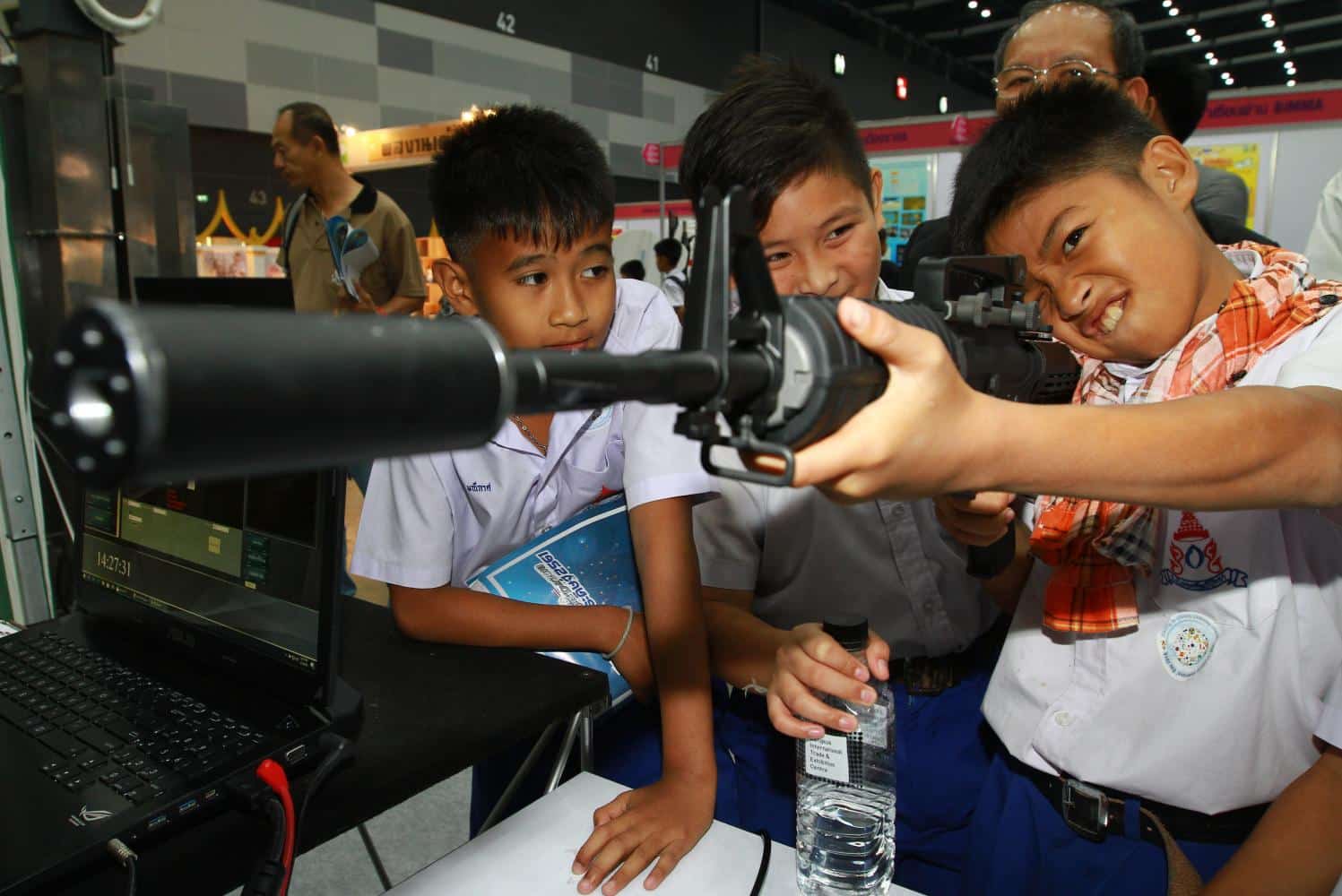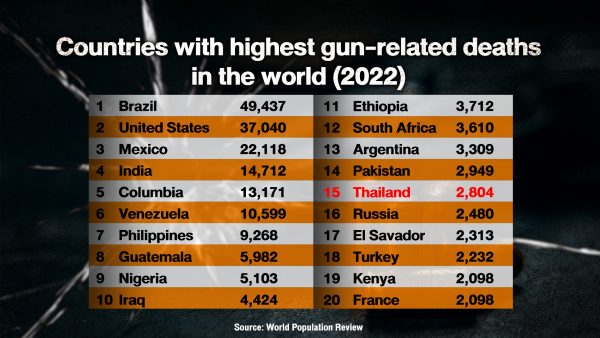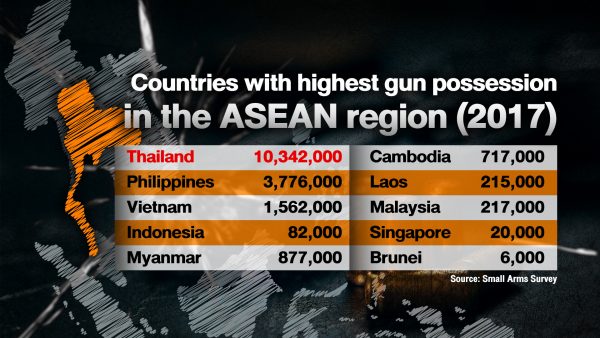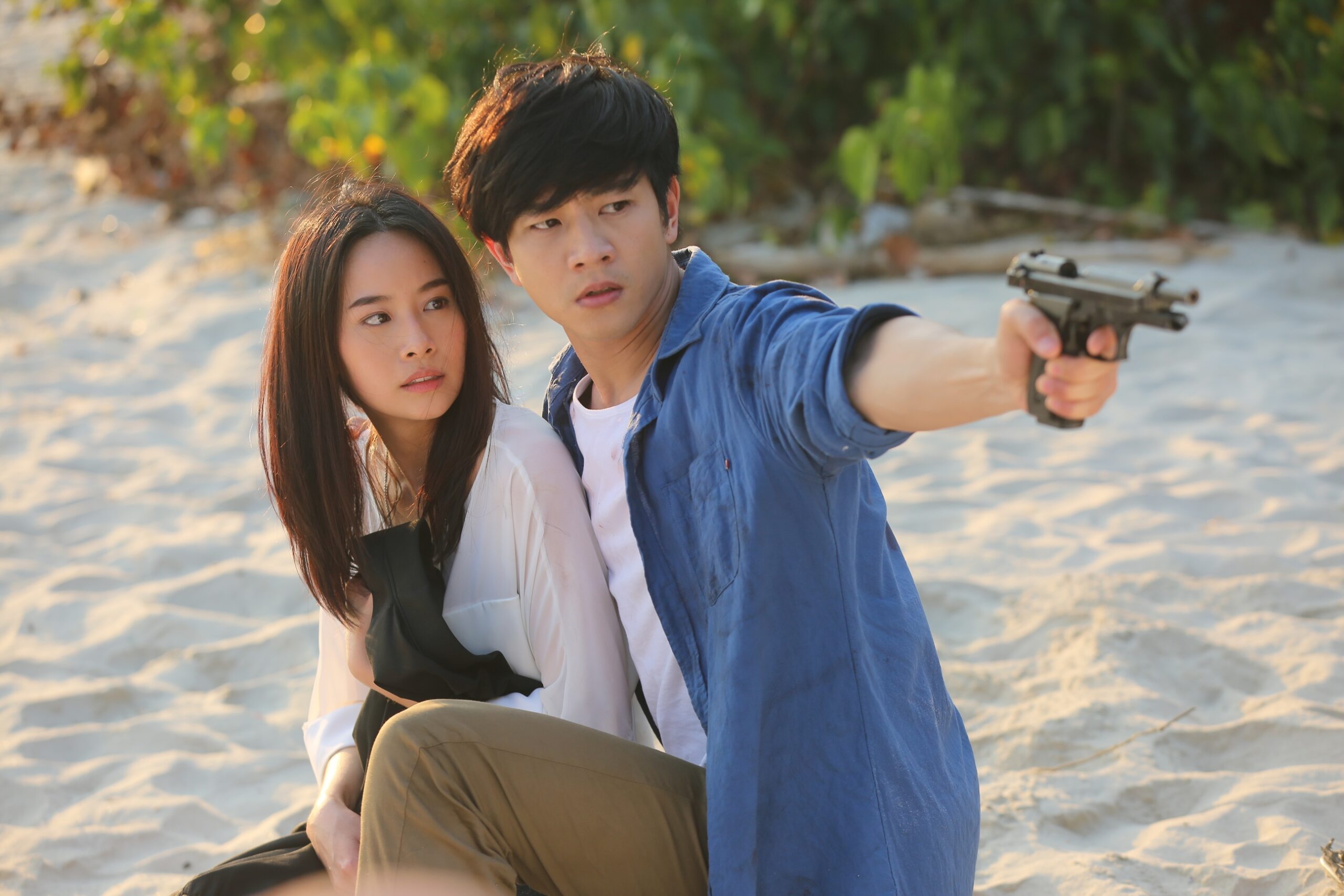News
Control on Guns in Thailand Remains Problematic

The most recent mass shooting in Thailand uncovered shocking information about the country’s high violence with guns and gun possession ranking. The mass shooting has also reignited the debate over gun regulations.
According to the World Population Review website, Thailand is now rated 15th among countries with the highest gun-related deaths and second in Southeast Asia.
Brazil, the United States, Mexico, India, and Columbia have the highest gun-related deaths, whereas the Philippines has the highest number of deaths in the ASEAN area.
While gun violence and mass shootings appear on the rise, Southeast Asia has less gun violence than other continents.

Gun violence is significantly more prevalent in the Americas.
Gun violence and homicides in Southeast Asia are also on the decline, according to the United Nations Office on Drugs and Crime (UNODC).
As a result, recent mass shootings in Thailand, in Nong Bua Lam Phu and Nakhon Ratchasima in 2020, are regarded as “unusual” for the region.
“Despite being horrific and tragic, we are not at proportions seen on other continents in Southeast Asia and Thailand,” said Julien Garsany, UNODC’s Deputy Regional Representative for Southeast Asia and the Pacific.
Julien adds that the availability of legal and illegal guns is the key reason Thailand has the highest gun possession rate among ASEAN countries. Such weapons are also widely available on the illegal market and online.
Thailand has the biggest number of guns in private hands among ASEAN member countries, according to the Small Arms Survey (SAS) in 2017.

A total of 10,342,000 weapons were documented, with 6,221,180 properly registered and the rest illegal. This means that 15 out of 100 Thais own guns.
The UNODC representative also stated that the majority of illegal firearms in Thailand were obtained through border trafficking. This signifies that the country is experiencing internal turmoil and instability.
“For example, on the borders with Malaysia, Cambodia, and Myanmar, we can see these flows of firearms flowing both ways, making it easier to acquire them.” When there is insecurity, firearms are certainly more readily available.”
Although lethal mass shootings are infrequent, gun violence is common in Thailand. People who follow the news are all too acquainted with such incidents, whether they occur between partners, family members, neighbours, or coworkers.
Aside from the Nong Bua Lam Phu atrocity, one of the most recent shootings occurred in Ubon Ratchathani province in August of this year, involving two competing gangs in a superstore parking lot. There were two fatalities and seven injuries.
In the same month, three individuals were injured in a gunfight in broad daylight involving over a dozen men from two rival ice factories in Ayutthaya.
Aside from the availability of (illegal) firearms, the media plays a significant influence in persuading people that gun ownership is the only way to protect themselves.

In Thai operas, guns are frequently used to express jealousy, fury, hatred, or despair.
Most scenarios depict gun violence as a means of exacting vengeance on adversaries or resolving convoluted issues such as love triangles, fighting over inheritance, or hierarchical tyranny.
The need for a gun also suggests that Thais have little faith in the government.
People no longer think that the police can successfully defend them when they are in difficulties, according to Thai criminologist Associate Professor Police Lieutenant Colonel Dr. Krisanaphong Poothakool.
“However, why don’t people in the United Kingdom, Japan, or Singapore believe they must own a gun?” Because their government guarantees people that if a crime occurs, the police would act quickly and give justice.”
Thailand’s Interior Ministry also maintains a “gun welfare” program in which state institutions such as the Royal Thai Police, the Customs Department, and state corporations purchase weapons for their employees at a significantly lower cost through local gun sellers.

There also isn’t a number limit on how many guns an official can purchase under this program, whether for self-defence, property protection, sports, or game hunting.
That means they can utilize this “right” to buy as many guns as they want.
“People currently believe that firearms should be kept as assets,” said Associate Professor Dr. Piyaporn Tunneekul, a criminologist at Nakhon Pathom Rajabhat University who studies firearms possession in Thailand.
According to Dr. Piyaporn, an official must keep their guns for up to three years under the gun welfare scheme. They can sell them after the three-year period is up.
However, she believes that the program should be limited to one firearm per person and that owners should be required to sell or destroy their old guns before obtaining a new one.
“That is why the figures appear so high, because one official holds multiple firearms, yet it is extremely difficult for ordinary people like us to obtain one.” This demonstrates how firearms represent power, and Thai people desire authority over others.”
Despite this “luxury,” it is still unclear how police officers who have already been fired have continued to have access to these firearms. This appears to be the core cause of the Nong Bua Lam Phu mass murder, in which an ex-police officer who was discharged for drug usage used his guns to commit the crime.

Thailand’s gun regulation and the process for licenses for guns should be strengthened.
Authorities may also consider revoking the firearms licenses of those convicted of heinous crimes.
“This is a huge problem we need to deal with,” he added. “There has never been a review or investigation of authorities or criminals convicted of drug misuse or other significant felonies, or even those demonstrating hostile behaviour or posting nasty or threatening remarks on social media.” We do not currently have such information in our databases.”
The mass murder at a daycare centre in Nong Bua Lam Phu province appears to have caused some reforms.
Prime Minister Prayut Chan-o-cha recently convened his first meeting on gun and illegal narcotics control to draft recommendations for successfully addressing drug abuse and gun-related violence.
They also addressed the possibility of withdrawing the weapons licenses of persons deemed a threat to society or addicted to drugs.
The Royal Thai Police are also considering removing guns from police officers who misbehave or are prone to gun violence, even if they were legally purchased. This policy might also include retired cops.
Although changing existing gun regulations are the top priority, Dr. Krisanaphong believes that short-term and long-term solutions should be employed to reduce gun violence.
“Now that we know the gunman was an ex-police officer with a history of drug misuse who used his firearms to commit the murder, we need to find out who else has been fired from the force or has been involved in drug abuse while on duty.”

To prevent similar deaths, the criminologist proposes having clear guidelines on revoking gun licenses and seizing guns from police officers who have committed drug-related crimes or other significant felonies.
As a long-term plan, mental health exams of police personnel who own firearms are also required at least once a year.
To stop cops from hoarding firearms, the government should also establish a restriction on the importation of firearms through the “gun welfare” scheme.
“The number of imported firearms must correspond to the number of officials who truly need to use them, whether police officers, military, or security officials,” Dr. Krisanaphong added.
“Assume you set a limit of no more than 5 million firearms for the entire country; authorities must determine whether the number of firearms on the market has reached that level.” If you’ve surpassed the limit, you can’t import anymore,” Dr. Piyaporn explained.
Similarly, the UNODC thinks gun control policies must be implemented at the regional, national, and institutional levels.
“There are two major UN international instruments.” The first is the UN Protocol against Illicit Trafficking in Firearms, and the second is the UN Arms Trade Treaty,” Julien explained.
“None of these have been approved by Thailand or other Southeast Asian countries.”
Apart from reviewing the UN’s international gun protocols, the UNODC proposes that the government critically reconsider existing gun regulations and assess the true purpose of gun possession.
Furthermore, the police and military, which handle guns regularly, must recognize early warning indicators as to whether some personnel are potentially dangerous and likely to harm others through firearms.
By Nad Bunnag and Jeerapa Boonyatus, Thai PBS






























